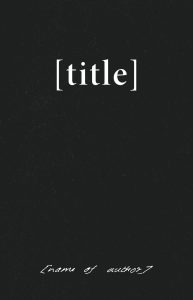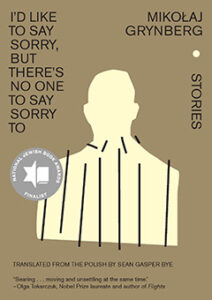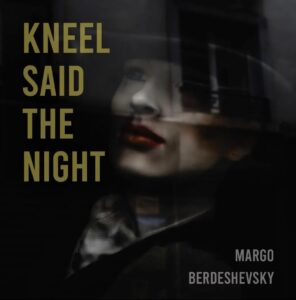Fiction. 90 pgs. Sublunary Editions. December 2021. 9781955190763.
[Title] by [name of author] is a textbook example of the “experimental” novel that defies convention for the sake of defying convention. Its thrust takes aim at the heart of authorship and the literary constructs we call “novels.” Luckily for authors and readers alike, it’s well wide of the mark with its cheap shots at what [name of author] clearly has an underdeveloped appreciation/understanding of: plot, conflict, character, et al. Ironically, these features deploy themselves in spite of [name of author]’s disdainful repudiation of them.
Above reverence to any ideal, [name of author] belittles the childish scribblings of “literature” and renounces his life’s work in this placeholding farce. Unlike Rimbaud, however, [name of author] needs to tell you all about his renunciation. He is like your friend who goes on and on about subjects purportedly beneath consideration, but since it is a book, you cannot stop him mid-stream and say “Okay, I get it.” Luckily,
…you’re under no obligation to remain here (there).
And can exit the “well-lighted room” at any time.
From that rich literary tradition of “Look how pathetic I am! How stupid and pointless everything is!” (Kafka, Beckett, Bernhard, et al.), [Title] follows the path of Protagonist as he paces back and forth in an “imaginary prison”. Unlike the characters of his tragicomic progenitors, however, [name of author]’s avatar lacks nuance, depth, gravitas. Beginning to end, he will “do” nothing. Read: literature “does” nothing. A bold if indefensibly facile statement which begs the question
of what the reader is “doing” in this book?
Being shown the exit might be [name of author]’s equivocal response, but it becomes abundantly clear as the narrative progresses that what he really wants is for you to wallow with him in his slough of despond,
…[Protagonist’s] vacant stare seems to implicate you there (here) in the middle distance. Because isn’t this what you’ve come for? To watch someone’s life fall apart from a safe distance? To amuse yourself with another’s anguish? Well, here (there) you have it.
Oh My Melancholy Baby, Protagonist.
What could be the point of pinpointing the pointlessness of this project [name of author] has undertaken? The only trace of any such greater purpose coincides with the cameo appearance of the specter of Marx in Chapter 50, Part II. This “Geist of Christmas [Past/Present/Future]” reads Protagonist the riot act as he roughs him up. Unfortunately, neither Author nor Protagonist respond to this wake up call,
Author would like to materialize and intervene on Protagonist’s behalf, but knows his issue is getting what he deserves. And yet he will no doubt remain as he was, is and ever shall be.
Unregenerate. Immaterial.
The End? Because if this really is the point–that literature is an immaterial, bourgeois opiate–then ensuing chapters would merely belabor that point, no? Bad news: you’re only at the halfway mark of this 99 Chapter (about a dozen of which are thankfully missing) “novel.” Protagonist still has many laps of pacing back and forth to regale you with. He will laugh “(mirthlessly),” feign weeping, go stir crazy, punch a wallpapered window, “daydream about the erroneous Other,” “ambulate the avant-garde treadmill,” gnaw on waxed fruit, “grow a beard by dint of not not growing a beard,” and ultimately end up in “a make-believe monastery” where he will busy himself in the “conceptual apiary and vegetable garden…thinking impenetrable thoughts.”
Exacerbating and contravening the narrative’s generic thrust are the intimations of Author’s traumatic childhood (a mentally ill mother and deceased father). These ostensibly autobiographical tidbits dispelled my suspicion/hope the book had been computer generated, which might have justified its anonymous, formalized message. (One presumes an algorithm would play by the rules and eschew trauma displays.) As with most else in [Title], this gesture transgresses its own categorical mandate by resorting to specificity. In fact, [name of author] only occasionally offers bracketed genera, more often opting for thinly veiled allusions and proper names he drops like erudition turds throughout the narrative. The backslashed “alternatives” presenting an opportunity to not just cite Robert Musil, for instance, but also Ralph Ellison/T.S. Eliot/et al.
And yet this glorified bibliography will no doubt find a readership among those intellectuals into self-flagellation, aimless iconoclasm, meta-maniacal tale-chasing, and Nabokovian wordplay. Though it’s entirely possible that [name of author] concurs with this withering assessment, this would hardly excuse–would in fact aggravate–his assault on the reader’s sensibilities.
The book is not devoid of wit, even at times pathos, but it all plays upon the ultrathin, transparent surface of a bubble enclosing a void. A novel (a work of art) either has substance or it doesn’t, and [Title] just doesn’t. Like much of the artillery in the anti-craft canon, it simply does not detonate, which may be the point, but then…what’s the point?
[Title] could have been a heady meditation on the unhealthy relationship between author and reader, but [name of author] would have had to resist writing it (nor related his resistance). As an unabashed proponent of craft (dirty word to the obscurantist intellectuals above mentioned), I’m afraid this reader (non semblable) cannot accept [name of author]’s in process apology for the wrong he’s doing/done with this [generic term for self-contradictory melancholia].
[Title] is available through Sublunary Editions. Purchase it now through their website.
ANTHONY CLIFTON is an entertainer from Memphis, Tennessee.
Like what you’re reading?
Get new stories or poetry sent to your inbox. Drop your email below to start >>>
OR grab a print issue
Stories, poems and essays in a beautifully designed magazine you can hold in your hands.
GO TO ISSUESNEW book release
Ghosts Caught on Film by Barrett Bowlin. Order the book of which Dan Chaon calls “a thrilling first collection that marks a beginning for a major talent.”
GET THE BOOK



